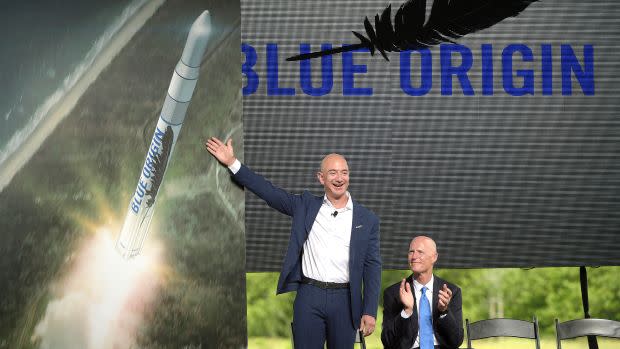Why Jeff Bezos and Blue Origin are suing NASA

When the existence of Blue Origin was first revealed by reporter Brad Stone in 2003, four years after the secretive start-up was founded, Jeff Bezos wouldn’t comment on his space company directly. Instead, he issued a pean to the National Aeronautics and Space Agency (NASA), that premiere purveyor of final frontier exploration.
“NASA is a national treasure, and it’s total bull that anyone should be frustrated by NASA,” the mogul wrote in an email to Stone. “The work NASA does is technically super-demanding and inherently risky, and they continue to do an outstanding job. The ONLY reason any of these small space companies have a chance of doing ANYTHING is because they get to stand on the shoulders of NASA’s accomplishments and ingenuity.”
Well, Bezos is now frustrated by NASA. Last week, Blue sued the space agency in federal court, arguing that it inappropriately awarded a multi-billion dollar contract for a lunar lander to Blue’s chief rival, Elon Musk’s SpaceX. Blue’s initial challenge to that decision was rejected by the Government Accountability Office, which found that NASA had not played favorites in choosing just one contractor due to lack of funding for two. The other members of its consortium, the companies Lockheed Martin, Northrop Grumman and Draper, declined to comment on the lawsuit their partner has brought.
Lawsuits between contractors and the government aren’t uncommon. In a way, they’ve helped define the rise of commercial space companies and SpaceX itself. But it’s worth looking at how this challenge diverges from others that arguably opened up low-earth orbit for business.
A brief history of rocket start-up lawsuits
SpaceX sued NASA in 2005, before it even launched its first rocket. At the time, another nascent rocket maker, Kistler Aerospace, was on the verge of bankruptcy. It suddenly received a $227 million NASA contract to share its test data with the government. SpaceX challenged the case, arguing that if the government wants commercial rocket test data, it should accept competitive bids, not hand a contract to a company led by a former high-ranking NASA official. NASA withdrew the contract with Kistler.
Nine years later, in 2014, SpaceX sued the government again; this time challenging the US Air Force’s decision to award a multi-launch contract to United Launch Alliance (ULA), the Boeing and Lockheed Martin joint venture that held a monopoly on US government spaceflight. (SpaceX had also challenged the creation of that monopoly in 2006.)
Again, SpaceX framed its challenge as a demand for fair competition that would benefit the government as well as its own bottom line. Much of that litigation is still sealed due to national security concerns and proprietary corporate data. But the ultimate outcome was a settlement that allowed SpaceX to begin bidding on military launches and break ULA’s monopoly in 2015.
These cases helped create an environment where NASA and the US military are more willing to use open bidding for contracts that might previously have been awarded with much less transparency.
SpaceX vs. Blue Origin in the courts
For one example, consider SpaceX’s most recent litigation with the government: In 2019, it sued the US Air Force after the branch awarded development funding for future military rockets to three competitors—Blue Origin, ULA, and Northrop Grumman—but not SpaceX. Musk’s firm lost that challenge, with the court finding in a sealed ruling that the Air Force had not erred in selecting among the competing bids.
Musk had wanted that funding for his next-generation rocket, Starship, but Air Force officials ultimately felt that vehicle was too advanced. In the end, the military would choose SpaceX and ULA for its next set of military launch contracts, and SpaceX didn’t challenge that result even though it got a smaller share of the contract. Starship, meanwhile, was chosen this year by NASA to bring astronauts back to the moon, which led to Blue Origin’s challenge.
There is a distinction between suing for the right to compete and suing for not winning the competition, and it’s true that the line can be blurry. Given that Blue’s proposal would cost $3 billion more than the one from SpaceX (although Bezos is offering to cover an additional $2 billion in costs), the perception in the aerospace world right now, even among some Blue Origin employees, is that the firm is taking a scorched earth approach.
That’s particularly because the company’s spokespeople have labeled the agency’s decisions reckless and unsafe. It’s a different style of rhetoric than even Musk has used when furious about government decisions: He has alleged corruption and lambasted officials for wasting money or not pursuing the most innovative technology, but he hasn’t suggested they are risking lives.
A version of this story first appeared in Quartz’s Space Business newsletter.
Sign up for the Quartz Daily Brief, our free daily newsletter with the world’s most important and interesting news.
More stories from Quartz:
Afghanistan has 22 tons of gold in a New York vault. The Taliban can’t touch it.
Psychologists say a good life doesn’t have to be happy, or even meaningful

 Yahoo Finance
Yahoo Finance 